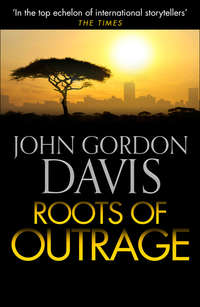
Полная версия
Roots of Outrage
The Freedom Charter was adopted by popular acclaim, though a group called the Africanists rejected it because of its multi-racialism: they wanted Africa for the Africans, and they broke away from the ANC to form the Pan Africanist Congress. The next day the people reconvened. That day the South African police struck, with a crack of thunder.
Suddenly the stadium was surrounded, and into the mass went the police. They photographed every individual, and they seized thousands of documents, looking for evidence of treason. Hundreds were arrested. Thus began the infamous Treason Trial.
It was held in the cavernous Johannesburg Drill Hall, remodelled to provide a massive dock to hold 156 accused, sitting in tiers. One of them was the young Xhosa lawyer called Nelson Mandela. The trial was to last for five years, the longest trial in history.
In those days the wind of change was starting to blow in Africa. In Kenya the Mau Mau rebellion was raging; in Ghana the Great Redeemer, Kwame Nkrumah, was demanding independence from Britain, proclaiming himself leader of the Pan African movement; in Nigeria and Tanganyika independence was being loudly demanded; in the Federation of Rhodesia and Nyasaland a policy of ‘Partnership’ was being attempted but black politicians were demanding immediate majority rule. The Cold War was raging and Russia was providing arms and training, inspiration and indoctrination to the black nationalists. The Western colonial powers, exsanguinated by two world wars, alarmed by the Cold War, had lost their will to govern, appeasement was becoming the order of the day, and the white settlers were afraid, and angry. But in South Africa the government said it had the answer to this Swart Gevaar, this Black Peril: they were building a model state which would keep the races apart, each to develop in its own way, enforced by kragdadigheid, strength-to-do, and South Africa would be the bastion against communism.
In those days the Mahoneys lived in a big old Victorian house near the centre of Umtata, capital of the Transkei. The garden occupied half a suburban block and Mrs Mahoney hired black convicts, called Tame Bandits, from the prison to keep it neat. George Mahoney had his law office in Main Street, which was wide enough to turn a wagon drawn by sixteen oxen, and there were hitching posts for horses. There were always many Xhosa in their red blankets in Main Street, smoking their long pipes, looking in the Victorian shop windows. The big old Victorian courthouse was set in large lawns, where crowds of Xhosa would sit, waiting for court to begin. On the benches outside George Mahoney’s office there were always dozens of Xhosa, waiting to consult the white lawyer who always won cases.
‘But there’s no money in being a small-town attorney, son,’ George told Luke. ‘None of my clients has much money. You’re going to be an advocate, son, in the big city, get amongst the big stuff.’
‘But he doesn’t want to be a lawyer,’ Mrs Mahoney said, ‘he’s talking about being a journalist.’
‘That’s this week. Next week it’ll be law again. I tell you, this son of ours is going to be a bloody good lawyer.’
‘But I don’t think it’s right for a boy of fourteen to be spending his afternoons and holidays in a stuffy law office.’
‘If I was a farmer my boy of fourteen would be ploughing the land. If I was a shopkeeper he would be helping behind the counter. There is no finer training for a law student than to sit in my office and watch how it’s done. Life in the raw! Crime, divorce, debt-collecting, he’ll have seen it all by the time he leaves school. The boy’s a natural.’
‘Well, I’m sorry but I really don’t think it’s right to spend so much time in court, hearing all those sordid details –’
‘The world is sordid and the best place to learn about it is the courtroom – the forum of human drama, learning to sift the wheat from the chaff, strong points from weak points –’
Beyond the courthouse was the Bhungha, an imposing white building which used to be the Native Representative Council until apartheid put an end to that; and opposite was the school for whites. Umtata had a population of only three thousand whites, but the school taught almost one thousand because most of the pupil’s were the children of the traders who lived way out in the rolling hills that stretched from the Kei River in the west to the Umzimvubu in the east, from the Indian Ocean in the south to the Drakensberg in the north, a territory almost the size of Scotland, of which George Mahoney was the parliamentary representative. On the other side of town, down near the winding Umtata River with its weeping willows, was the poorer part of town, where most of the Afrikaners lived, mostly artisans and railway workers, with chickens and maybe a cow in the backyard. Beyond them, on the very edge of town, lived the Coloureds, the half-castes, and this is also where Patti Gandhi lived.
Legally speaking, the Gandhi family should not have lived in a Coloured area, but in an Asian area, but as there were no other Indians in town the mentors of the Group Areas Act had not yet got around to zoning a separate residential area for them. Mr Gandhi was not allowed to trade in Main Street, which was a white area, but his store two streets back, where he had his small clothing factory, was also tolerated. It was in a grey area which the scientists in Pretoria would have to clean up one day, but until then the police did not know what to do with them.
For the same reason Patti Gandhi’s attendance at the white convent, St Mary’s College, had to be tolerated although she wasn’t even a Christian: the Coloured school was quite inadequate, and of course the government high school, which Luke Mahoney attended, was out of the question. It was George Mahoney who persuaded the police commandant to turn a blind eye, ‘until such time as this bloody government builds an Asian school just for her!’
‘She should be sent to school in Natal, where all the Indians are,’ Colonel Visser said uncomfortably.
‘For God’s sake, Colonel, you can’t tear a family apart! The girl’s in her formative years, the Gandhis are a very law-abiding family and it’s a great expense to send your child away to school!’
‘Old Gandhi’s got more money than you and me put together, sir, and I don’t know how law-abiding he is – look at that swank house he’s built illegally in the Coloured area.’
‘The man’s got to live somewhere and as the government hasn’t yet told him where that is, he’s perfectly entitled to build a decent house on the land he’s owned for decades. And that, you can take it from me,’ he said with more conviction than was warranted, ‘is the law.’ He appealed: ‘If the servants of God are prepared to help her, so should you.’
‘Okay,’ the colonel sighed, ‘I saw nothing. But –’ he held up a warning finger – ‘no sport, hey. No swimming, no hockey, no socializing, none of that nonsense. And one complaint and she’s on the bus to Natal.’
‘On my head be it!’ George Mahoney beamed. ‘She’ll cause no trouble. She’s exceptionally intelligent …’
And she was exceptionally good-looking. As a little girl she was angelic, as a nymph of twelve she was beautiful, as a fifteen-year-old she was gorgeous. She was tall and smooth of movement, with long black shiny hair that reached to her waist, long golden legs under her demure gym-skirt, a face to make one stare, big almond eyes and a smile, when she gave it, to melt the heart. And she caused plenty of trouble in the loins of the boys of Umtata High School. But they seldom saw her: her father drove her to and from school so she would be seen as little as possible in her convent uniform lest a complaint be raised. If the boys wanted to see her they had to go to the Gandhi Store, where she worked after school: but how many excuses could a lad find for buying in a ‘kaffir store’? She often worked in her father’s garment factory, but what excuse could a schoolboy find for visiting that? And when she was seen that beautiful smile was seldom given: she was an aloof, haughty girl.
‘She hasn’t got much to smile about, has she?’ Luke’s sister Jill said. ‘No friends.’
‘Aren’t your friends at the convent nice to her?’ Mrs Mahoney asked.
‘I mean after school.’
‘Well, she should be grateful she’s getting a decent education – and these people prefer their own company anyway.’
‘But there are no other Indians for her to be friends with. Can I invite her home one day to have a swim?’
Ooh, yes please, Luke prayed. Patti Gandhi in a swimsuit …
‘Definitely not. I’m not having Indians in our pool!’
Only one Indian … Mahoney prayed.
‘Mother, she’s perfectly clean, you know!’ Jill cried.
‘The subject,’ Mrs Mahoney said, ‘is closed.’
‘Well,’ Jill sulked, ‘can I at least invite her to my birthday party?’
Mrs Mahoney sighed. ‘No darling – she’ll be like a fish out of water. Who’ll dance with her?’
Me – me – me … Mahoney prayed.
‘I’m all for giving the girl a good education, but socializing with her is something entirely different. And what good will it do her? She can’t keep the friendships up afterwards – it’s even unkind to her …’
Jill turned in appeal to her father: ‘Daddy?’
George Mahoney sighed. ‘I think your mother’s right, my dear – if for different reasons. I promised Colonel Visser there’d be no socializing. I’ve got no objection to the girl coming to your party – and, by the way it’s not illegal – not yet – but that is socializing, and it’ll get back to your friends’ parents, and somebody may kick up a fuss, and it’ll get to the police and, well, I’ll have broken the bargain, won’t I, and Patti Gandhi could well be told to leave the convent. It could cause trouble, without her being in any way to blame …’
But Patti Gandhi was to blame for the trouble. It happened in Luke’s second-last year at high school. That was the year the government translocated the people of Sophiatown, the black spot in white residential Johannesburg, to Soweto, the sprawling black township on the outskirts of the golden city. The year of the heartbreak of Sophiatown, the destruction of a whole teeming city within a city, a whole way of life, to replace it with a white middle-class suburb to be called Triomf, meaning Triumph. For months the government had been warning the people of Sophiatown that the day was approaching when vehicles would come to move them; it was the day the lorries and bulldozers arrived that Patti Gandhi, fifteen years old, walked into the public library in Umtata, took a book off the shelf and sat down to read.
‘Excuse me,’ the librarian, nice Mrs van Jaarsveld, whispered, ‘but this library is for whites only.’
Ten minutes later Mrs van Jaarsveld felt obliged to fulfil her threat to call the police. An hour later Patti Gandhi was released by a fed-up Colonel Visser into the custody of her father with a stern warning not to try any funny business like that again. By nightfall it was the talk of the town.
‘Oh, hell!’ George Mahoney groaned.
The next day was Saturday, when the boarders at the girls’ hostel and the boys’ hostel were allowed into town. The big topic of conversation was what that Indian girl, Patti Gandhi, had done. At mid-morning she walked into the Rex Café, where the boarders were all tucking into their ice-creams and milk-shakes and, midst the ensuing sudden silence, sat down at an empty table, held out her money and asked the Coloured waitress for a Coca-Cola. The waitress called the owner. The owner called the police. ‘What,’ the Afrikaner constable demanded, ‘are you doing here, hey?’
‘I am endeavouring,’ Patti Gandhi said, ‘to quench my thirst.’
‘Well, jus’ you ender- whatchacallit along with me, hey …’
This time Colonel Visser was really angry. ‘Is this how you treat my kindness?’ He telephoned her father to come. ‘This is her last warning! Next time it’s straight into Juvenile Court! I hope you give her a bladdy good hiding, hey!’
‘I will, sir, thank you, sir,’ Mr Gandhi said.
He did not give her the hiding ‘which you deserve’ – ‘Don’t you realize we have no rights to even be here under the Group Areas Act?’
‘That’s exactly what I realize. And nor do the people of Sophiatown have any rights!’
‘Sophiatown!’ the old man shouted. ‘I’m sick of hearing about Sophiatown! Just thank your lucky stars you’re not in Sophiatown but in Umtata where people are kind to us!’
‘Kind?’ She rolled her flashing eyes. ‘God help us when they get unkind!’
‘Here we can survive, because of nice people like Mr Mahoney and Colonel Visser whose hand you bite –’
‘“Bite!” Reading a book is a bite? Asking for a Coca-Cola!’ She bared her teeth. ‘Just wait till I do bite …’
‘Don’t you threaten me!’ Mr Gandhi wanted to slap her face but checked himself. ‘Don’t you threaten our existence! We’ve survived and that is an achievement! Your grandfather came here as a coolie to cut cane for a rupee a day, and now look at us! Look at this house! Look at our factories!’
‘And look at my great-uncle! He ended up liberating India from the British!’
‘And I suppose you want to liberate South Africa with your library books and Coca-Colas!’
‘Yes!’ Patti hollered. ‘Yes, yes, yes!’
Quivering with rage, her father sent her to bed for the rest of the day. But as soon as he had gone back to the factory she climbed out of the window, and cycled to her father’s store. She unlocked the back door and went to the hardware counter. With bolt-cutters she sliced off two metres of chain. She selected two stout padlocks and a pair of pliers. Then she rode across town to the municipal swimming pool.
Saturday was a big day at the municipal pool. In the afternoons most of the girls from the high school and convent came to meet their boyfriends. The fenced lawns around the pool were choked with young bodies when Patti Gandhi arrived. She parked her bicycle with the others, then set off to approach the area from the back.
She crept up the storm-water culvert that led up the side of the big fence, then into the shrubbery beyond. She crept up to the hedge that lined the mesh-wire fence. With the pliers she cut a hole.
Nobody noticed Patti Gandhi wriggling through, nobody noticed her until she strolled across the lawn, her lovely young body golden, her breasts bulging and her hips slowly swinging, her soft thighs stroking each other, her long black hair down to her waist, her seldom-seen smile all over her beautiful face: then every head was turning. Patti Gandhi sauntered across the lawn, carrying a little hold-all, her towel trailing languidly, making for the high-diving board. She climbed up it, two hundred pairs of astonished eyes upon her. She had reached the top and sauntered out to the end of the board when the pool manager, Frikkie van Schalkwyk, came bustling out of his office.
‘Hey!’ he shouted furiously. ‘Hey! Get out of here, man!’
Patti gave him a wave and her magnificent smile, dropped her hands to her knees, stuck out her beautiful backside at him and shook it. And a gasp went up from the white boys and girls, then laughter, then scattered clapping that gathered momentum. Patti Gandhi stood on the tip of the diving board, grinning and waving and blowing kisses, and Frikkie van Schalkwyk, of the Umtata Municipality Recreation Department, gave a roar of outrage and charged.
Frikkie ran up the steps onto the lawns, puffed around the top end of the pool, leaping over the gleeful white bodies, heading for the high-dive on the other side. He scrambled furiously up it, huffing his municipal outrage, and as he reached the top Patti blew him a splendid kiss, and she dived.
Patti Gandhi dived in a beautiful beaming swallow, just as Frikkie burst onto the board to roars of derision. She disappeared under the water in a streaming of long black hair. Frikkie blundered to the end, furiously shouting at the water, torn between diving in after her and retracing his outraged steps to confront her on the other side with the long arm of the law. Patti broke surface in the centre of the big pool, tossed back her long hair like a whiplash and beamed up at Frikkie: ‘Come in! The water’s lovely!’
And Frikkie hurled himself in after her. He landed in a mighty belly-flop to roars of delight and ‘Go, Frikkie, Go!’ and ‘Faster, Frikkie, Faster!’ from the gleeful teenagers. Frikkie van Schalkwyk thrashed with all his might across the pool to apprehend the delinquent Patti Gandhi, and Patti Gandhi laughed and reached the ladder on the other side just as Frikkie was reaching the middle.
She scrambled lightly up it, her. golden body glinting, and she skipped joyfully to the head of the pool to draw Frikkie that way and cried: ‘This way, Frikkie –’
Frikkie changed direction and thrashed towards her, and Patti skipped back the other way and shouted: ‘Over here, now, Frikkie, over here –’
But Frikkie van Schalkwyk, custodian of the Municipality of Umtata Bye-Laws (Recreational Facilities) (Swimming Pool) as amended, was no fool, hey. Not for him to thrash this way and that to the tune of a cheeky bladdy Coolie, hey: he heaved himself up the ladder in a furious gush, and stomped off to summon the police, to laughter and cries of ‘Spoil-sport.’ Patti Gandhi sauntered back to the high diving-board, grinning, and began to climb again.
Luke Mahoney was near the foot of the ladder. He watched Patti climb, looking up at her legs, and the beauty of what he saw, her lovely rounded bottom, her golden thighs, the sheer female magnificence of her, was to stay with him for the rest of his life.
Patti reached the top, unzipped her little hold-all, and pulled out the chain. She wrapped it once around her waist, and padlocked it into position. She wrapped the other end around the ladder, and padlocked that. She picked up both sets of keys and slipped them into the panties of her bikini. Then she lay down decorously to sunbathe while she waited for the police.
‘Where’re the keys?’ the sergeant demanded.
‘Up my pussy,’ Patti smiled.
It took an hour to get Patti Gandhi down because the police had to retreat to find bolt-cutters. She was sorely tempted to push the policeman off the high-dive into the water, uniform and all, but she resisted it: No violence, great-uncle Mahatma Gandhi had said, Passive resistance only … But passive resistance meant she had to be carried down the ladder over the shoulder of the sergeant (who enjoyed clutching her lovely thigh), had to be carried bodily out of the swimming pool grounds.
She made a very dramatic spectacle, her beautiful buttocks up in the air, her long black hair hanging down the policeman’s rear, sweeping the ground, being carried away by the long arm of the law to face justice. There was no more laughter: a silence that was almost awe had descended on two hundred white teenagers, almost shame. Patti Gandhi had made her point. Her great-uncle would have been proud of her.
Luke Mahoney pulled on his clothes, jumped on his bicycle and rode flat out up the hill to the golf club to find his father, his face suffused with anger, his heart bursting with guilt, and pity. ‘I’ll finish my game,’ George said, on the tenth green, ‘it won’t do her any harm to spend a few hours in the cells before I get her out. It may save her from many, many more in the future. That girl is headed for big trouble …’
‘She’s in very big trouble now!’ Colonel Visser said furiously. ‘Christ, man, Mr Mahoney, I’ve turned a blind eye to the convent, and I’ve given her two chances in two days! Christ, girl, what have you got – a death wish?!’
‘On the contrary, sir,’ Patti said quietly, ‘I have a life wish.’
‘A life wish …’ Colonel Visser groaned. ‘Christ, young lady, I’ve tried to give you a decent life, and to do that I risked my life – my career. Got, man, if my superiors in Pretoria knew that I knew about that convent business, I would face disciplinary proceedings, hey!’ He held a finger out at her nose. I risked my career for you, because your father here has never given us any trouble! But you! You’re a disgrace to your family and your race! …’
‘Oh my goodness gracious me, sir,’ Mr Gandhi said, ‘I apologise for my daughter, sir …’
‘Apologise to the magistrate on Monday!’ Colonel Visser shouted at Patti, ‘apologise for all the trouble you’ve put us to! And the trouble you’ve caused Mr Mahoney! Apologise for the shame you’ve caused your father, who’s never put a foot wrong in his life here!’ He wagged a finger: ‘Take my advice and throw yourself on the mercy of the court, young lady, and apologize. And maybe that will save you from reform school!’
Patti looked at the good colonel with big beautiful almond eyes: Reform school?’
‘Yes! Because you’re a born troublemaker if ever I saw one –’
‘Trouble?’ Patti said with big eyes. ‘I’m causing trouble?’
‘Yes! Breaking the law deliberately! Christ, man, can’t you see what trouble, what … chaos people like you could cause in this town – in this country! Christ, man, we live surrounded by millions of kaffirs! Can you imagine the trouble if millions of kaffirs came into this town and tried to swim in our swimming pool! Or went to the library and demanded books?! Or went to the Rex Café, hey, man?! Got, man, there would be chaos, hey! And that’s why these laws are necessary! Yes, necessary! There must be order, hey! And you, young lady –’ he jabbed his finger at her – ‘are trying to destroy this order with your bladdy silly nonsense!’
He turned to George Mahoney: ‘No, sir, I can’t withdraw the charges this time! Okay, I’ll give her bail, but it’s Juvenile Court on Monday! And then she’s on that bus to Natal to the other Indians if she wants any further education, hey! No more convent, thank you very much! Not only does she bite the hand that helps her, she commits malicious damage to property, cutting a hole in the Municipality’s fence!’
Patti leapt to her feet. ‘“Malicious Damage to Property”?’ she cried. She pointed north furiously: ‘At this moment, as we speak, the bulldozers of the South African government are smashing down the whole of Sophiatown!’
3
Sophiatown. A teeming black city within the golden city of Johannesburg, a sprawling mass of run-down houses and shacks, grubby shops and fly-blown markets, bleak churches and mosques, bazaars and shebeens and brothels and sweatshops and junkyards and outdoor lavatories, a slum city of rutted lanes that turned to mud in the rains and swirling dust in the hot dry winds of the highveld winter, a sprawling slum of blacks and Coloureds and Indians and Chinese and poor-whites, mangy dogs and scrawny chickens, riddled with gangs of tearaways and petty criminals, a city of thieving and robbery and knifing and murder and fighting and trickery and protection rackets and disposal of stolen property, drug-dealing and the illegal brewing of the fire-water called skokiaan: Sophiatown was an eyesore, insanitary, an offence to the exquisite sensibilities of the new social science called Apartheid.
‘But only because it’s in the wrong place in terms of this dreadful Group Areas Act!’ George Mahoney thundered in parliament. ‘If Sophiatown were safely out of sight beyond the mine-dumps it would not matter a jot to this government that it is an insanitary place, Sophiatown could then rot in Hell for all this government cares!’
‘Is the Honourable Member for Transkei aware that Sophiatown is also a den of iniquity where so-called liberal young whites, such as university students, think it’s funny to go dancing to black music, dancing amongst blacks, dancing with blacks even, and drinking illegally in their shebeens, and smoking dagga and even contravening the Immorality Act with black prostitutes, hey!’







